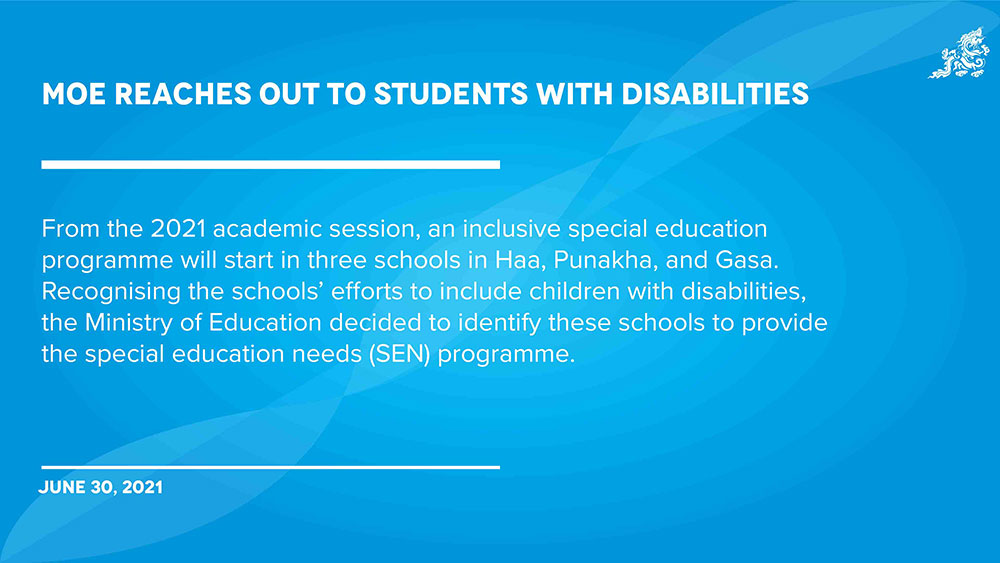Yangchen C Rinzin
A total of 39 children with disabilities in far-flung areas of Haa, Punakha, and Gasa will have better opportunity to access to education with three schools now declared as schools for inclusive and special education programme.
The programme will start from 2021 academic session.
Bjishong Central School in Gasa with 18 students with disabilities, Tshaphel Lower Secondary School with 14 students in Haa, and Khuruthang Middle Secondary School in Punakha with seven students, were identified as inclusive and special education programme.
The schools had taken their own initiative to teach these students by enrolling them in the schools despite lacking basic training on the special education needs (SEN) and lack of special education needs specialised teachers.
School administration also took extra effort to teach these students by giving remedial classes and by supporting the students in their [school’s] own capacity.
Deputy chief programme officer with MoE, Pema Chhogyel, said that recognising the schools’ effort, the ministry decided to identify these schools to provide inclusive and SEN programme.
He said with this, it would ensure that children are safe and cared for, their social and emotional needs are met and supported, and the students would have required supports to help realise their true potential.
“The benefit of identification of schools is that such programme would support all children irrespective of their abilities and disabilities,” Pema Chhogyel said. “The ministry will also provide capacity building of the teachers for inclusive and special education programme, provide them with assistive technology/devices, and develop accessible infrastructure.
Bjishong Central School’s principal, Karma Sangay, said that with this, it would encourage parents to enrol children with disabilities in the school with the confidence that teachers are trained to handle such cases.
“We have children with disabilities in the community. We plan to prepare in six months to encourage and enrol as many students to provide them education,” he said.
The identification of the SEN schools was made possible with UNICEF support of USD 15,000.
With the inauguration of these three schools, there are today 23 schools in the country with inclusive and special education needs programme, including Wangsel Institute for the Deaf in Paro and Muenselling Institute for Children with Visual impairment in Khaling.
There are about 780 students with special needs across the country; more than 850 teachers are oriented and sensitised on the programme.
SEN teacher shortage
However, today, there is still shortage of specialised SEN programme teachers, by almost 109 teachers less than the required number. The country today has about 87 teachers who have specialised in special education.
Education ministry requires about 109 teachers immediately to fill the gap as an immediate intervention for SEN children and to prevent any development delays as per their 12th Plan.
The ministry had also recommended the government during the midterm review to recruit 109 teachers on contract in April. It was estimated to cost about Nu 26.16 million (M) annually.
It was also recommended to recruit ‘teacher assistants’ with minimum qualification of Class XII, which could cost the nation Nu 27M for 150 teachers.
Without adequate teachers, the ministry could face challenges such as students with disabilities not getting appropriate intervention and services.
Early Childhood Development and Care and SEN division’s chief programme officer, Sherab Phuntshok, said that the initiative could burden teachers in the schools with SEN programme.
He said, however, that the Royal Civil Service Commission (RCSC) had approved teacher recruitment exercise for the inclusive and special institutes. Special institutes and schools with SEN programme, he added, will receive enough teachers to provide the services to children with disabilities.
As per the recruitment exercise, 109 teachers are expected to join schools to fill the gap after graduation from two colleges of education in December.
The RCSC last year provided 36 teachers and the commission has proposed training for experienced teachers as SEN teachers.
Pema Chhogyel said that with the inauguration of SEN programmes, the ministry’s focus now was also in providing disability-friendly infrastructure for accessibility. “However, it will entirely depend on the availability of budget and the priority of the respective dzongkhag administration”
Edited by Jigme Wangchuk


